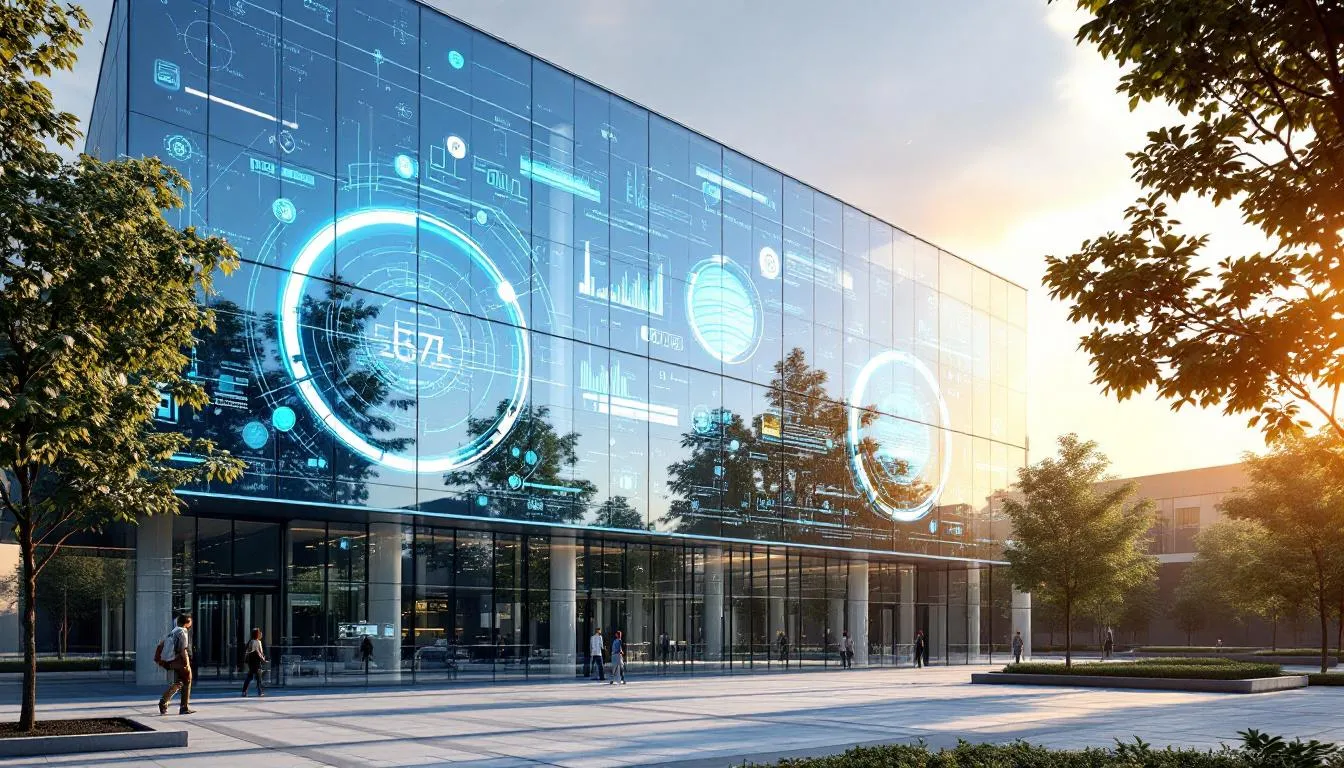
Artificial Intelligence and Real Estate: Transforming Property Markets in 2025
Key Takeaways
AI is projected to generate $34-180 billion in efficiency gains for the real estate industry by 2030, with 37% of commercial real estate tasks being automatable
Major applications include automated property valuations, virtual tours, smart building management, predictive analytics, and AI-powered chatbots for client communication
Over 700 companies now provide AI-powered real estate solutions, with AI firms occupying 2.04 million square meters of US real estate space as of 2025
Early adopters report up to 708% ROI and 59% energy savings through AI implementation in building management and operations
Successful AI integration requires strategic data management, organizational change, and careful risk mitigation to address bias and privacy concerns
The real estate industry stands at the precipice of a technological transformation that promises to reshape how properties are valued, marketed, managed, and sold. Artificial intelligence and real estate have converged to create unprecedented opportunities for efficiency gains, cost savings, and enhanced customer experiences across the entire property ecosystem.
As we navigate through 2025, the integration of ai tools and advanced algorithms into real estate operations is no longer a futuristic concept—it’s a present reality delivering measurable results. From automated property valuations that process comparable sales in minutes to ai enabled solutions that optimize building energy consumption, the real estate sector is witnessing a fundamental shift in how business is conducted.
The numbers speak volumes about this transformation. Morgan Stanley projects that artificial intelligence could unlock $34 billion in efficiency gains across the real estate industry by 2030, while McKinsey estimates potential value creation of $110-180 billion for real estate companies through generative ai applications. With 37% of commercial real estate tasks now considered automatable, forward-thinking real estate businesses are positioning themselves to capitalize on these emerging technologies.

The Economic Impact of AI on Th Real Estate Industry And Real Estate Market
The economic implications of artificial intelligence integration in the real estate market extend far beyond simple cost reduction. Morgan Stanley estimates that the real estate industry could realize $34 billion in efficiency gains by 2030 through strategic ai automation and advanced algorithms implementation. This projection represents a fundamental shift in how real estate companies operate and create value for their stakeholders.
McKinsey’s analysis presents an even more ambitious outlook, projecting potential value creation of $110-180 billion for real estate companies through generative ai applications. These figures reflect the transformative power of ai technology when applied to traditional real estate processes, from property management to investment decision-making.
The automation potential within commercial real estate reveals significant opportunities for operational efficiency. Industry analysis indicates that 37% of commercial real estate and REIT tasks can be automated, particularly in management and maintenance functions. This automation capability extends across various property types, with lodging and healthcare REITs positioned to see 15-34% operating cash flow improvements through strategic ai applications.
Early adopters in the real estate sector are already demonstrating the tangible benefits of ai integration. Companies implementing comprehensive ai solutions report 10% or greater improvements in net operating income through enhanced operations, predictive maintenance, and optimized resource allocation. These results validate the business case for ai investment across the real estate value chain.
The labor market implications of this technological transformation are equally significant. Real estate firms that embrace ai tools can redeploy human resources from routine tasks to higher-value activities like client relationships, strategic planning, and complex negotiations. This shift creates new revenue streams while improving overall productivity and job satisfaction among real estate professionals.
Core AI Applications And AI Tools Revolutionizing Real Estate
Automated Property Valuation and Market Analysis
The foundation of modern real estate decision-making increasingly relies on machine learning algorithms that analyze vast amounts of data points to deliver accurate property valuations. Automated Valuation Models (AVMs) represent one of the most mature ai applications in the real estate market, processing comparable sales, market trends, and property characteristics to generate instant valuations.
Companies like Zillow and Redfin have pioneered the use of predictive analytics in residential property valuation, utilizing advanced algorithms to analyze historical sales data, neighborhood trends, and property features. These systems can process millions of data points in seconds, delivering valuations that would traditionally require days or weeks of manual analysis by human appraisers.
The sophistication of modern AVMs extends beyond simple price estimation. These systems now synthesize unstructured data from lease terms, performance metrics, and market conditions to support investment decisions. By analyzing patterns in successful property investments and market cycles, ai tools help investors identify undervalued assets and optimal timing for acquisitions or dispositions.
Commercial real estate applications demonstrate even greater complexity, as ai systems analyze large amounts of market data including rental rates, vacancy trends, demographic shifts, and economic indicators. This comprehensive analysis enables real estate professionals to recognize patterns that human analysts might miss, leading to more informed investment strategies and risk management approaches.
Virtual Tours and 3D Property Visualization
Computer vision technology has revolutionized how potential buyers and tenants experience properties before physical visits. Matterport’s Cortex AI creates immersive 3D virtual tours using deep learning algorithms that process spatial data to generate photorealistic property representations. This technology has become essential for real estate agents seeking to expand their reach beyond geographical limitations.
Nvidia’s Omniverse technology represents the cutting edge of virtual staging and property visualization. These ai enabled solutions allow real estate professionals to create outputs that showcase properties in various configurations, enabling potential tenants to visualize spaces customized to their specific needs. This capability is particularly valuable in commercial real estate, where space configuration significantly impacts leasing decisions.
The business impact of virtual tour technology extends beyond convenience. Properties with AI-generated virtual tours experience higher engagement rates and more qualified leads, as potential buyers can thoroughly explore properties before scheduling in-person visits. This pre-screening process improves efficiency for real estate agents while reducing unnecessary travel for buyers and sellers.
Virtual reality applications powered by artificial intelligence also enable architects and developers to showcase projects before construction completion. These tools help identify design issues early in the development process while allowing potential buyers to experience finished spaces months or years before delivery.

Smart Building Management and Operations
The integration of artificial intelligence into building management systems represents one of the most impactful applications of new technology in real estate operations. AI-powered HVAC optimization systems demonstrate remarkable results, with implementations achieving energy consumption reductions of up to 59% while maintaining optimal comfort levels for occupants.
Royal London Asset Management’s experience with JLL’s AI-powered Hank technology exemplifies the transformative potential of smart building solutions. The company achieved a remarkable 708% ROI within the first year of implementation, demonstrating how ai automation can deliver both environmental benefits and significant cost savings.
Smart sensors and IoT devices integrated with machine learning algorithms enable predictive maintenance strategies that prevent equipment failures before they occur. These systems continuously monitor building performance, identifying patterns that indicate potential issues and automatically scheduling maintenance activities. This proactive approach reduces operational costs while improving tenant satisfaction through minimized service disruptions.
The environmental impact of AI-powered building management extends beyond energy savings. Large office buildings implementing comprehensive ai solutions report carbon emission reductions of up to 500 metric tons annually. These achievements support corporate sustainability goals while reducing operating expenses, creating a compelling business case for ai adoption in property management.
AI-Powered Tools for Real Estate Agents
Client Communication and Lead Management
The evolution of customer data analysis and client interactions has been dramatically enhanced by artificial intelligence, with virtual assistants and chatbots now handling 24/7 client inquiries across the real estate industry. These ai tools provide immediate responses to potential buyers and tenants, delivering important information about properties, neighborhoods, and available services without requiring human intervention.
ChatGPT and similar generative ai platforms have transformed how real estate agents create marketing content and maintain client relationships. These tools analyze past interactions to suggest personalized follow-ups, improving conversion rates while freeing agents to focus on high-value activities like lease negotiation and complex client needs.
Advanced customer relationship management systems powered by artificial intelligence now track buyer preferences, search patterns, and communication history to optimize client matching. Real estate firms using these ai applications report improved client satisfaction and higher transaction success rates, as the technology helps agents identify the most suitable properties for each potential buyer.
The ability to answer questions immediately and provide comprehensive property information has become a competitive advantage for real estate businesses. Automated communication systems handle routine inquiries while escalating complex issues to human agents, ensuring efficient resource allocation and improved client service quality.
Document Analysis and Lease Management
The processing of large amounts of legal documents and lease agreements has been revolutionized by ai technology capable of analyzing complex contractual language and extracting key terms. Artificial intelligence systems can now process extensive lease document repositories, summarizing critical information like rental rates, lease terms, and market conditions with remarkable accuracy.
Generative ai applications excel at filtering leases by specific parameters and creating organized data tables that would require hours of manual review. These tools identify potential risks and flag complex issues for specialist review, ensuring that important information doesn’t go unnoticed during the due diligence process.
AI-powered copilots assist real estate professionals with tenant requests and lease negotiations by analyzing historical agreements and market data to suggest optimal terms. This technology supports agents in making informed decisions while maintaining consistency across portfolio management activities.
The time savings achieved through automated document analysis create significant value for real estate companies managing extensive property portfolios. Tasks that previously required dedicated staff can now be completed in minutes, allowing teams to focus on strategic decision-making and client relationship management.

Marketing Content Personalization
The application of artificial intelligence to marketing content creation and audience targeting has transformed how real estate companies reach potential buyers and tenants. AI systems analyze customer data to create personalized property recommendations based on browsing history, search preferences, and demographic characteristics.
Automated content generation tools now produce tailored marketing materials for specific audience segments, optimizing messaging for different buyer personas and property types. These ai applications create outputs that resonate with target audiences while maintaining brand consistency across all marketing channels.
Predictive analytics enable real estate professionals to optimize ad placement and identify emerging market trends before they become apparent to competitors. By analyzing patterns in buyer behavior and market data, these tools help real estate businesses allocate marketing budgets more effectively and target the most promising leads.
Personalized marketing campaigns powered by artificial intelligence build trust with potential clients by demonstrating understanding of their specific needs and preferences. This targeted approach increases success rates in property transactions while reducing marketing costs through improved efficiency.
Industry Transformation and Market Growth
The Growing AI Real Estate Ecosystem
The artificial intelligence and real estate convergence has created a rapidly expanding ecosystem of specialized technology providers and innovative solutions. As of late 2024, over 700 companies provide AI-powered real estate solutions, ranging from predictive analytics platforms to virtual tour technologies and smart building management systems.
The physical presence of ai companies in the real estate market itself tells a compelling story about industry growth. AI firms currently occupy 2.04 million square meters of US real estate space, with projections indicating expansion to 5.2 million square meters by 2030. This growth reflects both the increasing number of ai companies and their expanding workforce requirements.
Geographic clustering of artificial intelligence businesses has created new demand patterns in the real estate market. Approximately 42% of US AI companies concentrate in the San Francisco Bay Area, with additional hubs developing in Boston, Seattle, and New York. This concentration drives commercial real estate demand in these markets while creating premium pricing for suitable office space.
Investment in artificial intelligence reached unprecedented levels in 2024, with US private AI investment totaling $109 billion—double the 2023 amount. This capital infusion fuels continued innovation in real estate applications while supporting the growth of companies developing ai enabled solutions for property management, investment analysis, and customer service.
Infrastructure Requirements and Data Center Growth
The computational demands of artificial intelligence applications require extensive infrastructure investments that are reshaping the real estate sector. AI training processes demand high-performance computing power, specialized cooling systems, and robust network connectivity, driving demand for hyperscale data centers designed to support these requirements.
Hyperscale data centers supporting ai workloads are projected to increase rack density at a 7.8% compound annual growth rate, creating new opportunities for real estate developers and investors specializing in technology infrastructure. This growth favors locations with access to affordable energy, reliable power grids, and proximity to major internet exchange points.
Geographic expansion of data center development increasingly focuses on regions offering lower energy costs and favorable regulatory environments. Markets in Atlanta, Malaysia, and Thailand have emerged as preferred locations for new ai infrastructure, demonstrating how artificial intelligence requirements influence global real estate investment patterns.
Edge data centers represent another growth segment driven by ai applications requiring real-time processing capabilities. These smaller facilities, located near major population centers, support applications like virtual assistants and predictive analytics that serve real estate businesses and their clients.
Implementation Strategies for Real Estate Companies
Building AI-Ready Organizations
Successful integration of artificial intelligence into real estate operations requires comprehensive organizational change management and strategic planning. C-suite alignment around business-led AI roadmaps tied to specific value chain segments ensures that technology investments support core business objectives rather than implementing ai for its own sake.
Investment in modern technology infrastructure creates the foundation for effective ai implementation. Real estate companies must develop integrated systems with feedback loops and robust security measures to support the data flows and processing requirements of advanced algorithms and machine learning applications.
The creation of prompt libraries tailored to real estate scenarios ensures consistent outputs from generative ai tools while maintaining quality standards across different use cases. These libraries help real estate professionals maximize the value of ai technology while minimizing the learning curve associated with new tools.
Development of new operating models that scale with portfolio growth and diversification positions real estate firms to leverage ai benefits as their business expands. This strategic approach ensures that technology investments continue delivering value as company needs evolve and market conditions change.

Data Strategy and Management
The effectiveness of artificial intelligence applications in real estate depends heavily on access to high-quality, comprehensive data sets. Focus on collecting unique, proprietary real estate data creates competitive advantages that generic market information cannot provide. This includes tenant behavior patterns, space utilization metrics, energy consumption data, and detailed maintenance histories.
Implementation of centralized data lakehouses provides the flexible, secure data access required for sophisticated ai tools and conversational assistants. These systems must accommodate both structured data from financial systems and unstructured data from documents, images, and sensor networks.
Proper data engineering and governance frameworks ensure that ai applications can access clean, reliable information while maintaining data quality standards. Without these foundations, even the most advanced algorithms cannot deliver accurate insights or reliable predictions for real estate decision-making.
Integration of vendor systems creates unified data environments that eliminate silos between property management platforms, CRM systems, and financial applications. This integration enables ai tools to analyze comprehensive data sets and provide holistic insights across all aspects of real estate operations.
Risk Management and Ethical Considerations
Addressing AI Risks in Real Estate
The implementation of artificial intelligence in real estate operations introduces new risks that require proactive management and monitoring. Compliance with housing discrimination laws and ethical standards becomes more complex when ai algorithms influence property valuations, tenant screening, and marketing targeting decisions.
Bias detection systems help ensure fair treatment across all demographic groups by monitoring ai outputs for patterns that might indicate discriminatory practices. These systems are particularly important in applications affecting lending decisions, property valuations, and tenant selections, where biased algorithms could perpetuate historical inequities.
Protection of tenant and buyer data privacy requires robust cybersecurity measures and careful consideration of how customer data is collected, stored, and used by ai systems. Real estate companies must balance the benefits of personalized services with privacy concerns and regulatory requirements.
Avoiding ai use in critical areas where current technology limitations could create safety or legal risks protects both companies and their clients. Emergency response systems, for example, should maintain human oversight even when supported by ai technology, ensuring that life-safety decisions receive appropriate attention.
Regulatory and Compliance Challenges
Emerging regulations focus on data quality, intellectual property, privacy protection, and labor market implications of ai implementation. Real estate companies must stay current with evolving legal frameworks while ensuring their ai applications comply with existing fair housing and lending regulations.
The need for toxicity checks and hallucination guardrails in real estate ai applications helps prevent inappropriate or inaccurate content generation. These safeguards are particularly important for client-facing applications like chatbots and automated marketing content creation.
Risk of deepfakes, impersonation, and fraud requires vigilant monitoring systems and verification processes. As ai technology becomes more sophisticated, the potential for misuse increases, requiring real estate professionals to implement appropriate authentication and verification measures.
Environmental impact considerations for energy-intensive ai computing requirements align with growing corporate sustainability commitments. Real estate companies must balance the operational benefits of ai technology with its environmental costs, seeking efficient implementations that minimize energy consumption.
Future Outlook and Market Predictions
The trajectory of artificial intelligence and real estate integration suggests accelerating adoption and increasingly sophisticated applications in the coming years. Survey data reveals that 89% of C-suite leaders believe ai can solve major commercial real estate challenges by 2025, indicating strong executive support for continued technology investment.
Workforce transformation expectations are equally dramatic, with over 90% of real estate industry leaders anticipating that ai will change operational practices within five years. This transformation extends beyond simple automation to encompass new business models, service offerings, and competitive strategies that leverage ai capabilities.
The talent market reflects growing demand for ai expertise within real estate organizations. AI job postings have increased 250% since early 2021, driving demand for skilled professionals in major technology hubs and creating new career opportunities in the real estate sector.
Global economic impact projections suggest that artificial intelligence could increase worldwide GDP by 14% by 2030 through productivity gains across all industries. The real estate industry’s historically conservative approach to new technologies positions it to benefit significantly from strategic ai adoption that learns from early implementation experiences in other industries.
The real estate sector’s technology laggard status actually presents opportunities to leapfrog traditional development cycles by implementing proven ai solutions developed for other business contexts. This approach allows real estate companies to avoid the trial-and-error costs associated with emerging technologies while benefiting from mature ai applications.
As we look toward the future, the convergence of artificial intelligence and real estate will continue reshaping how properties are developed, marketed, managed, and transacted. Companies that embrace this technological transformation while managing associated risks will be best positioned to thrive in an increasingly competitive and efficient market environment.
The space between where the real estate industry stands today and where it’s heading represents one of the most significant opportunities for business transformation in recent decades. Real estate professionals who focus on understanding and implementing ai technology strategically will create sustainable competitive advantages while delivering enhanced value to their clients and stakeholders.
FAQ
How much does it cost to implement AI in real estate operations? Implementation costs vary widely depending on the scope, but early adopters report ROI of 700%+ within the first year. Basic AI tools like chatbots can cost $50-500/month, while comprehensive building management systems require $10,000-100,000+ initial investment.
Can AI completely replace real estate agents and property managers? No, AI enhances rather than replaces human professionals. While AI can automate 37% of routine tasks, complex negotiations, relationship building, and strategic decision-making still require human expertise. AI serves as a “co-pilot” to boost productivity.
What types of real estate data are most valuable for AI applications? Proprietary data including tenant behavior patterns, space utilization metrics, energy consumption, maintenance histories, and local market microtrends provide the greatest competitive advantage. Public data alone limits AI effectiveness.
How accurate are AI-powered property valuations compared to traditional appraisals? AI valuations are typically accurate within 5-10% for residential properties in data-rich markets, but should complement rather than replace professional appraisals for high-value transactions. Accuracy improves with more local data and market-specific training.
What are the biggest security risks when using AI in real estate? Key risks include data breaches exposing sensitive tenant/buyer information, AI bias leading to discrimination lawsuits, deepfake fraud in virtual tours, and regulatory compliance violations. Proper cybersecurity measures and bias testing are essential.




